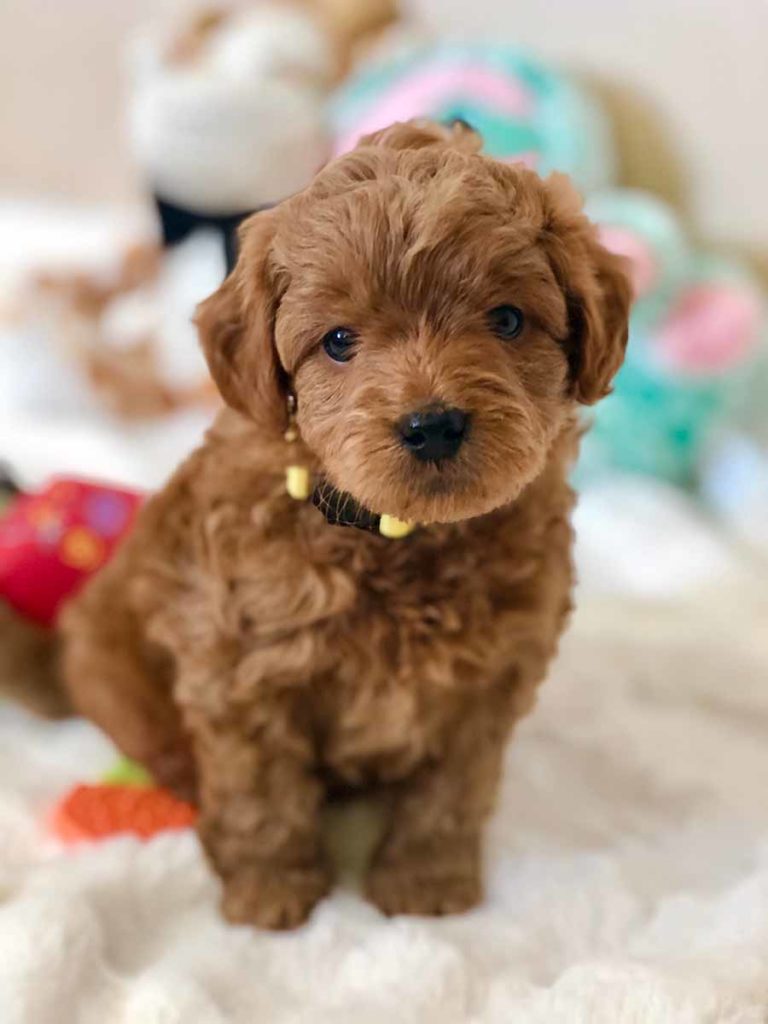Teacup Goldendoodles: Size, Care & More!
Are you seeking a companion that combines irresistible charm with manageable size? The teacup Goldendoodle, a tiny embodiment of canine cuteness, promises to capture your heart and offer a unique blend of companionship.
Delving into the world of Goldendoodles, particularly the teacup variety, unveils a fascinating blend of characteristics and considerations. These miniature marvels, a cross between Golden Retrievers and Toy Poodles, have become increasingly popular, captivating dog lovers with their diminutive stature and endearing personalities. While their size might be small, their impact on the hearts of their owners is undeniably significant. The teacup Goldendoodle represents the pinnacle of small Goldendoodle variations, frequently weighing between 7 to 15 pounds and standing at a petite 7 to 13 inches tall when fully grown. Their appeal is undeniable, however, potential owners must be aware of the nuances associated with this breed, including health considerations and specific care requirements.
| Characteristic | Details |
|---|---|
| Size | Typically weighs 7-15 pounds and stands 7-13 inches tall. |
| Colors | Diverse range including golden, cream, apricot, red, black, and parti-colored. |
| Coat Types | Vary from wavy to curly, influenced by the poodle parent. |
| Grooming | Requires regular brushing (daily recommended) to prevent matting and tangles. Professional grooming every 4-6 weeks is often needed. |
| Temperament | Known for their friendly, affectionate, and intelligent nature. They are generally good with children and other pets. |
| Health Concerns | Prone to certain health issues, including hip dysplasia, progressive retinal atrophy (PRA), and heart problems. Responsible breeding and regular vet checkups are crucial. |
| Lifespan | Typically 10-15 years, though this can vary depending on genetics and overall health. |
| Training | Highly trainable due to their intelligence and eagerness to please. Positive reinforcement methods are recommended. |
| Shedding | Often considered hypoallergenic, but individual shedding can vary based on the coat type. Regular grooming helps minimize shedding. |
| Diet | Requires a balanced diet appropriate for their age, size, and activity level. High-quality dog food is recommended. |
| Exercise | Needs moderate exercise daily, including walks, playtime, and mental stimulation. |
| Origin | A mixed breed, typically created by breeding a Golden Retriever with a Toy Poodle, or by breeding two Toy Goldendoodles. |
| Other Names | Sometimes referred to as miniature or petite Goldendoodles. |
For additional information and resources, please consult the American Kennel Club (AKC).
The creation of a teacup Goldendoodle is a deliberate process. Often, breeders utilize Toy Poodles in their breeding programs. This targeted approach results in dogs that inherit the appealing traits of both parent breeds, all within a remarkably compact package. The intention is to produce a dog that embodies the best characteristics of its lineage, from the Golden Retriever's gentle nature to the Poodle's intelligence and hypoallergenic qualities.
One of the primary draws of the teacup Goldendoodle is its size. Easily carried and cuddled, their small stature makes them suitable for various living situations, from apartments to spacious homes. Their manageable size also translates to easier grooming and, in some cases, lower food costs. Their petite size contributes to their endearing aesthetic, but it is essential to recognize that their small size also makes them more vulnerable and prone to certain health concerns.
If you're searching for a small dog that doesn't shed much, the teacup Goldendoodle could be a good fit for you. They are often considered hypoallergenic and do not shed much, making them appealing to people with allergies. However, it's important to note that no dog is truly 100% hypoallergenic. Regular grooming is still essential to maintain their coat and minimize any shedding.
The teacup Goldendoodle's personality often mirrors that of its larger Goldendoodle counterparts. They tend to be friendly, affectionate, and eager to please. This makes them relatively easy to train, responding well to positive reinforcement techniques. They are frequently described as being great with children, elderly individuals, and other pets, making them excellent family companions.
However, the teacup Goldendoodle is not without its challenges. Their small size means they can be more fragile, susceptible to injuries, and may have specific health concerns. Responsible breeders prioritize health testing and genetic screening to minimize the risk of inherited diseases, but prospective owners must be prepared for potential veterinary expenses and the need for specialized care.
Caring for a teacup Goldendoodle involves a commitment to its health and well-being. This includes providing a balanced diet specifically formulated for small-breed dogs, regular exercise tailored to their energy levels, and consistent grooming to maintain their coat. Routine vet checkups and vaccinations are also critical to ensure their health and longevity.
Training is an essential aspect of responsible ownership. Goldendoodles, including the teacup variety, are intelligent and trainable dogs. Positive reinforcement techniques, such as treats and praise, work best to encourage desired behaviors. Early socialization is also essential to help them develop into well-adjusted, confident companions.
The price of a teacup Goldendoodle can vary. Several factors influence the cost, including the breeder's reputation, location, and the dog's pedigree. Due to their high demand, teacup Goldendoodles can sometimes be more expensive than other Goldendoodle sizes. Prospective owners should research breeders carefully, ensuring they follow ethical breeding practices and prioritize the health of their dogs.
When searching for a teacup Goldendoodle, it's crucial to identify a reputable breeder. A good breeder will be knowledgeable about the breed, prioritize the health and well-being of their dogs, and provide appropriate health testing. They should be open to answering questions and willing to provide references from previous puppy buyers. You can often find listings online, but remember to do your own due diligence before making a commitment.
The term "teacup" can be misused. Some breeders might exaggerate the size of their puppies, so it's crucial to be wary of claims that seem unrealistic. Always visit the breeder's facility, if possible, and meet the puppy's parents to assess their size and temperament.
The longevity of a teacup Goldendoodle, like any dog, is influenced by several factors, including genetics, nutrition, and overall care. While they often live for 10-15 years, their lifespan can be shortened if they have health problems or are not properly cared for.
In summary, the teacup Goldendoodle offers a unique blend of charm, personality, and portability. They are small, affectionate dogs that can make excellent companions for individuals and families. However, potential owners must be aware of the breed's specific care requirements, including health considerations, grooming needs, and the importance of responsible breeding practices. Choosing a teacup Goldendoodle is a significant decision; a well-informed approach can pave the way for a fulfilling, loving relationship with this adorable miniature pup.


